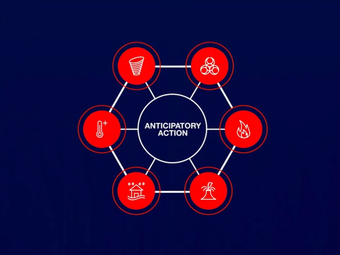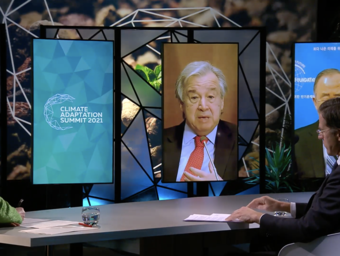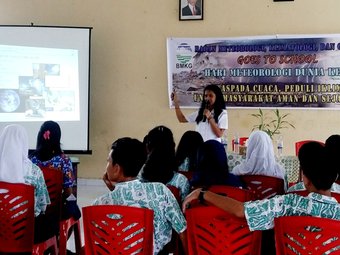Networks and forums
There are a range of existing networks including, forums, partnerships and platforms that are directly supporting or highly relevant to anticipatory action.
These collaborative networks compliment the Anticipation Hub’s priorities to facilitate knowledge exchange and strengthen policy and advocacy on anticipatory action directly through adjoining topics like early warning and early action, or through specific topics like data management, insurance or hazards, which provide additional knowledge and insights to support anticipatory action.
To foster an environment for more in-depth discussions around common challenges facing the mainstreaming and scale-up of anticipatory action, in September 2018, core AATF members came together (FAO, IFRC, OCHA, START Network, WFP) and formed the informal Anticipatory Action Task Force (AATF). The role of the AATF is to provide technical expertise, knowledge and learning and to promote partnerships to ensure country-level needs and best practises are shaping the anticipatory-action agenda at the global level.
The Capacity for Disaster Reduction Initiative (CADRI) is a global partnership that helps countries reduce disaster and climate risks through providing access to a unique pool of multidisciplinary expertise in various socio-economic sectors to achieve the 2030 Agenda and leave no one behind. Drawing upon the diversity of expertise of its members, CADRI offers a broad range of services to countries including capacity diagnosis, prioritization and planning, training and referral services.
Learn more here: https://www.cadri.net/
The Cash Hub, hosted by British Red Cross, aims to accelerate the use and increase the scale-up of cash assistance in the International Red Cross and Red Crescent Movement (the Movement) in order to improve the effectiveness and efficiency of humanitarian action.
The Centre for Humanitarian Data was established by the United Nations Office for the Coordination of Humanitarian Affairs (OCHA), and is dedicated to increasing the use and impact of data in humanitarian response. The Centre manages the Humanitarian Data Exchange (data.humdata.org), the preeminent open-source platform for finding and sharing humanitarian data.
Learn more at https://centre.humdata.org.
This hub was created by the British Red Cross for the International Red Cross and Red Crescent Movement, to help promote a consistent approach to community engagement and accountability. The hub contains learning materials, tools and guidance to help users integrate community engagement and accountability into their work.
FOREWARN is the Forecast-based Warning, Analysis and Response Network coordinated by START network. FOREWARN is a multi-stakeholder community that can quickly come together to support to humanitarian decision-making on the ground, and support advocacy to help early action become the norm. Members of the FOREWARN community meet quarterly to share learnings and discuss challenges and solutions around early action work; and five national level FOREWARN pilots are now underway in Madagascar, Bangladesh and the Philippines with DRC and Pakistan starting soon!
Further details about the global, national and thematic FOREWARN groups can be found under working groups.
GEO is an intergovernmental partnership of 112 countries working to improve the availability, access and use of open Earth observations, including satellite imagery, remote sensing and in situ data, to impact policy, decision making and action in a wide range of sectors. It is coordinated by a Secretariat based in Geneva.
The Global Flood Partnership is a multi-disciplinary group of scientists, operational agencies and flood risk managers focused on developing efficient and effective global flood tools that can address these challenges. Its aim is to establish a partnership for global flood forecasting, monitoring and impact assessment to strengthen preparedness and response and to reduce global disaster losses.
The Global Heat Health Information Network (GHHIN) is an independent, voluntary, and member-driven forum of scientists, practitioners, and policy makers focused on improving capacity to protect populations from the avoidable health risks of extreme heat in our changing climate.
The Global Platform for Disaster Risk Reduction is a biennial multi-stakeholder forum established by the UN General Assembly to review progress, share knowledge and discuss the latest developments and trends in reducing disaster risk. The Global Platform for Disaster Risk Reduction is a critical component of the monitoring and implementation process of the Sendai Framework for Disaster Risk Reduction (2015-2030).
International Network on Multi-hazard Early Warning Systems (IN-MHEWS), a multi-stakeholder partnership, facilitates the sharing of expertise and good practice on strengthening multi-hazard early warning systems as an integral component of national strategies for disaster risk reduction, climate change adaptation, and building resilience. It supports the implementation of the Sendai Framework for Disaster Risk Reduction 2015-2030, especially the achievement of its global target G on multi-hazard early warning systems.
The InsuResilience Global Partnership for Climate and Disaster Risk Finance and Insurance is an interactive, inclusive global multi-stakeholder platform that brings together countries, civil society, international organizations, the private sector, and academia to promote financial resilience for the world’s most vulnerable. It was launched at COP23 in Bonn 2017 as a joint G7, G20 and V20 initiative.
Convening partners of REAP worked together to set four ambitious targets which will drive a systemic shift towards acting earlier to reduce the impacts of disasters. The targets highlight the importance of national planning, financing and delivery mechanisms to support early action, as well as investment and coverage in warning systems with a focus on them reaching the most vulnerable, turning the last mile into the first mile.
To know more about REAP please email reap.secretariat@ifrc.org
To learn more about how REAP and the Anticipation Hub collaborate - click here.
The Knowledge-Action Network (KAN) on Emergent Risks and Extreme Events provides an open platform for scientific communities from across science disciplines and engineering working on extreme events, disaster risk reduction and governance to exchange information, knowledge and data and engage in collaborative research activities. The Knowledge Action Network on Emergent Risks and Extreme Events is a joint initiative of the Future Earth, IRDR, WCRP and WWRP programs.
The Risk KAN hosts working groups on multiple topics including a Working Group on Early Warnings for Systemic Risk that aims to provide networking opportunities for those working on early warnings for meteorological hazards, with a particular focus on systemic and cascading risks.
Learn more here.
The Platform on Disaster Displacement is a state-led initiative working towards better protection for people displaced across borders in the context of disasters and climate change. The platform builds strong partnerships between policymakers, practitioners and researchers and constitutes a multi-stakeholder forum for dialogue, information sharing and policy development.
Understanding Risk (UR) is an open and global community of over 9,000 experts and practitioners interested and active in the creation, communication and use of disaster risk information. UR community members share knowledge and experience, collaborate, and discuss innovation and best practice in disaster risk assessment.




